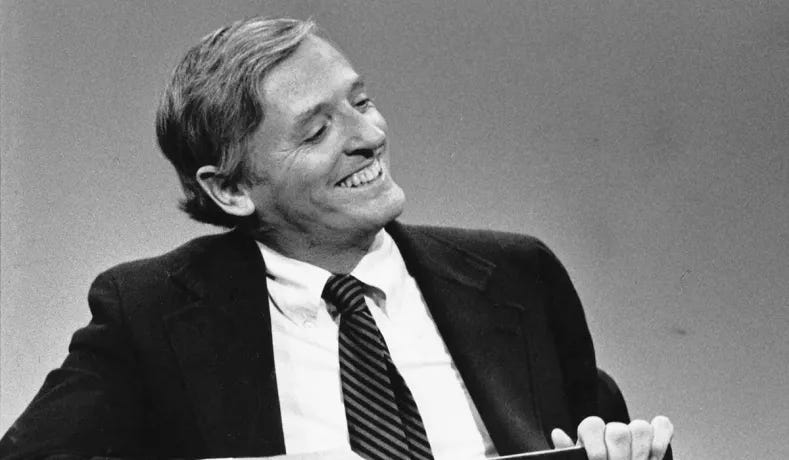Looking for William F. Buckley Jr.
I reviewed Sam Tanenhaus's three-decades-in-the-making biography of post-war conservatism's ebullient architect.
If you follow this newsletter, you likely know that I cohost a podcast about the American right called “Know Your Enemy.” And you may have noticed that our podcast logo features the gayly grinning face of one William F. Buckley Jr, the founder of National Review, who recreated American conservatism in his own — stylish, patrician, sophistic — image during the years of the Cold War.
The funny thing is: Buckley isn’t really one of our main subjects. Naturally, he comes up a lot in passing, but because he didn’t write any particularly serious books — his greatest contributions were organizational and aesthetic rather than theoretical — our show, primarily an exercise in intellectual history, doesn’t have as much time for him as some of the figures he recruited into the NR fold: Russell Kirk, Frank Meyer, Willmoore Kendall, James Burnham, Garry Wills, etc.
That is to say, on KYE, we have a definite bias for those conservatives who thought deeply about difficult questions, and that really can’t be said of Bill Buckley. It’s for this same reason, to some listeners’ chagrin, that we spend so little time assaying today’s “political entertainers” — Ben Shapiro, Charlie Kirk, Matt Walsh, Tucker Carlson, and so on — who are much more proximately Buckley’s heirs than any living right-wing intellectual. If this is a failing of the show, it’s one we’re unlikely to elaborately rectify. There’s enough bad faith tendentiousness in the highbrow works of conservative thought we read; I don’t think I can bear the unvarnished ideological hucksterism of a Ben Shapiro on top of everything else.
Nonetheless, Buckley is important — as a historical actor, and as a model for his vapid cultural spawn. And after 27 years of work, Sam Tanenhaus has come out with his authorized biography, Buckley: The Life and The Revolution that Changed America, which I’ve reviewed for The Ideas Letter. For those looking for my assessment of Buckley’s contributions, legacy, and personality, look no further:
Through the strength of his personality and will, Buckley transformed the American right — in the eyes of the public — from a sordid, benighted affair, undertaken by paranoid eccentrics and venal tycoons, into a respectable political movement with intellectual foundations and literary flare. For much of his life, Buckley and American conservatism were synonymous, and both benefited from the association. But the years since his death, in 2008, have strained the reputation of the movement he built, causing many to question whether it ever deserved the respectability Buckley claimed on its behalf.
I loved Tanenhaus’s 1998 biography of Whittaker Chambers, and this (1000 page!) book is leavened by the same literary craft, psychological sensitivity, and archival doggedness. As you’ll see, I have some reservations about the project as as whole — is Buckley really worthy of this magisterial treatment? — but given the material at hand, Tanenhaus pulls it off brilliantly. And ultimately, he helped me see Buckley's virtues (such as they are) much more clearly:
[T]he reason for Buckley’s dogged pursuit of Chambers is that he, like Tanenhaus, saw the vastness in him — a depth that he lacked and therefore coveted in others. Buckley, for all his arrogance, was the rare history-making figure who succeeded by reckoning his own limitations. “The challenge,” Buckley wrote of sailing, his other great passion, “lies in setting the sails as quickly as you know how, in trimming them as well as you know how; in handling the helm as well as you can; in getting as good a fix as you can; in devising the soundest and subtlest strategy given your own horizons…” What Buckley lacked in pathos, and genius, he made up for in his acute sensitivity to these qualities in others. His gift was his febrile admiration, his boyish intensity of affection. It was in the flattering light of Bill Buckley’s admiration that so many men were moved to put their own genius in service of his cause.
I hope you’ll read the rest of the essay, and please share it around. We’ll have Tanenhaus on the podcast next week to discuss Buckley and the book. Thank you and stay tuned.




Longtime listener and reader here, Sam. Fan of the pod and subscriber! Been eagerly awaiting your episode on Buckley.
My wife and I listened to your episode about Pope Francis recently, and we both remarked how deeply moving it was—positive, humanistic, consoling.
And that got us both to observe that as much as we love Know Your Enemy, how much better would it be to have another show called Know Your Friend? Or to have more episodes on KYE that are about thinkers and figures that you and Matt admire and love, the kinds of intellectuals, historical figures, artists, religious leaders, etc whom you are inspired by?
It was so consoling and nourishing to hear your analysis of Francis—his writings, his vision and impact—and it brought out the best in both of you as well. In these dark times, it lifted up our souls to hear about a good person—eulogized by two other good people. My wife and I were like, “Yeah, more of that please!”
Also, as a leftist, I feel that the Left intellectual tradition just gets short-shrift in general outside the confines of academia. Aside from Marx, people just don’t know much about the pantheon of thinkers and historical figures—they get less attention than the Right, and conservative intellectuals tend not to write about the Left figures with quite the same depth and judiciousness as Tannenhaus and other liberals do for the Right.
So, would love to see a spinoff pod: KYF! Anyway, unsolicited feedback from the peanut gallery.
Great review Sam! And of course the podcast is intellectual history and ought to stay that way. The ideas of these entertainers are downstream of thoughtful people anyway